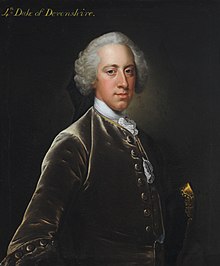William Cavendish, 4th Duke of Devonshire
|
His Grace The Duke of Devonshire KG PC |
|
|---|---|
 |
|
| Prime Minister of Great Britain | |
|
In office 16 November 1756 – 25 June 1757 |
|
| Monarch | George II |
| Preceded by | The Duke of Newcastle |
| Succeeded by | The Duke of Newcastle |
| Personal details | |
| Born | 8 May 1720 |
| Died | 2 October 1764 (aged 44) Spa, Austrian Netherlands |
| Political party | Whig |
| Spouse(s) | Charlotte Boyle (m. 1748; d. 1754) |
| Children | 4 |
| Religion | Church of England |
| Signature | |
William Cavendish, 4th Duke of Devonshire, KG, PC (8 May 1720 – 2 October 1764), styled Lord Cavendish before 1729 and Marquess of Hartington between 1729 and 1755, was a British Whig statesman and nobleman who was briefly nominal Prime Minister of Great Britain. He was the first son of William Cavendish, 3rd Duke of Devonshire and Catherine Hoskins.
He was elected MP for Derbyshire in 1741 and 1747. Devonshire was a supporter of Sir Robert Walpole and, after Walpole's fall from power, of the Pelhams. Henry Pelham wrote to Devonshire's father that he was "our mainstay among the young ones, of themselves liable to wander".
Horace Walpole described him as "a favourite by descent of the Old Whigs" and as "errant [a] bigot to the Pelham faction as ever Jacques Clément was to the Jesuits".
He had been offered the post of governor to the Prince of Wales but he declined.
Pelham appointed him Master of the Horse, a post he held until 1755 and which necessitated his leaving the House of Commons for the House of Lords by writ of acceleration as Baron Cavendish and joining the Privy Council. Devonshire supported the Duke of Newcastle after Henry Pelham's death in 1754 and was Lord Lieutenant of Ireland from 2 April 1755 until 3 January 1757 in Newcastle's administration. In April 1755 Devonshire was one of the Lords Justices of the realm upon the King's absence in Hanover.
...
Wikipedia
